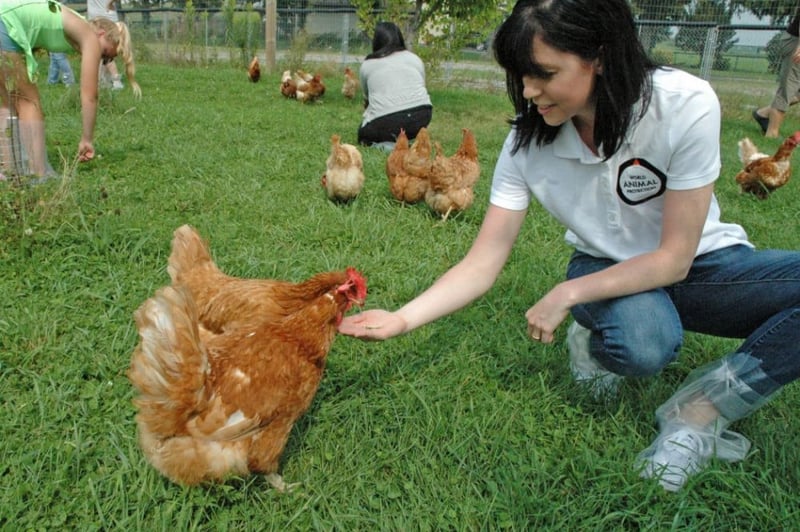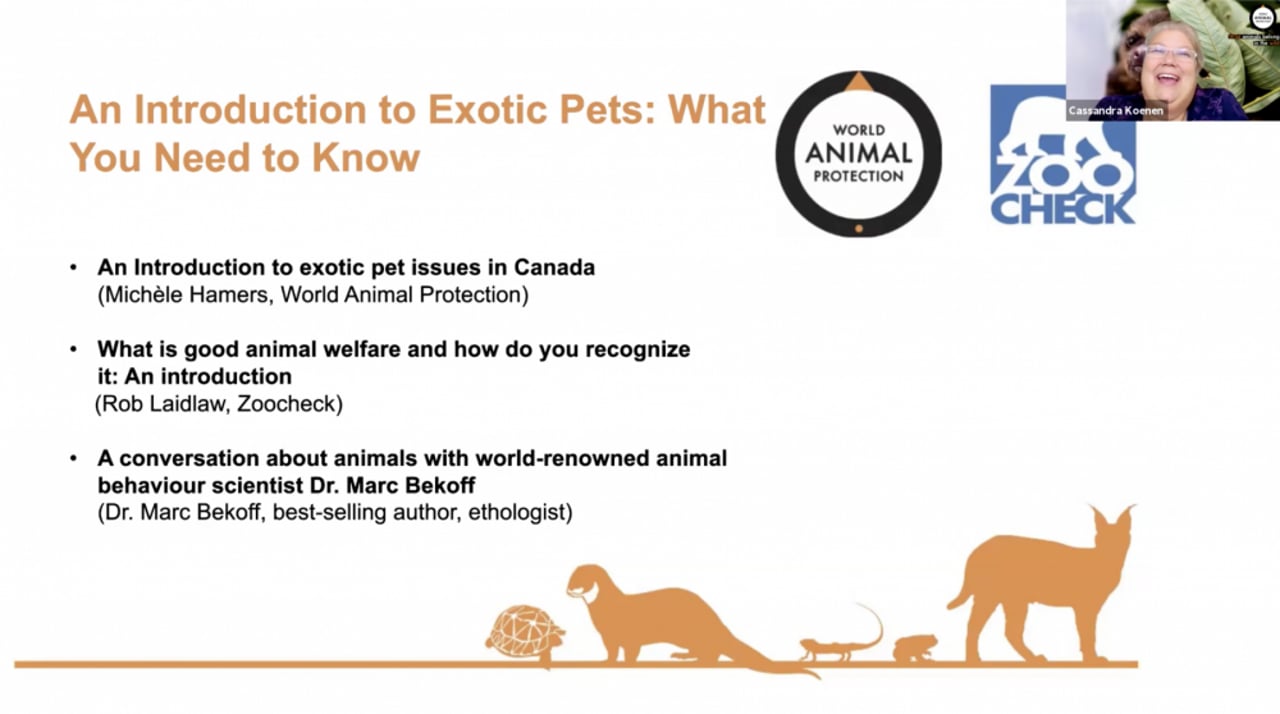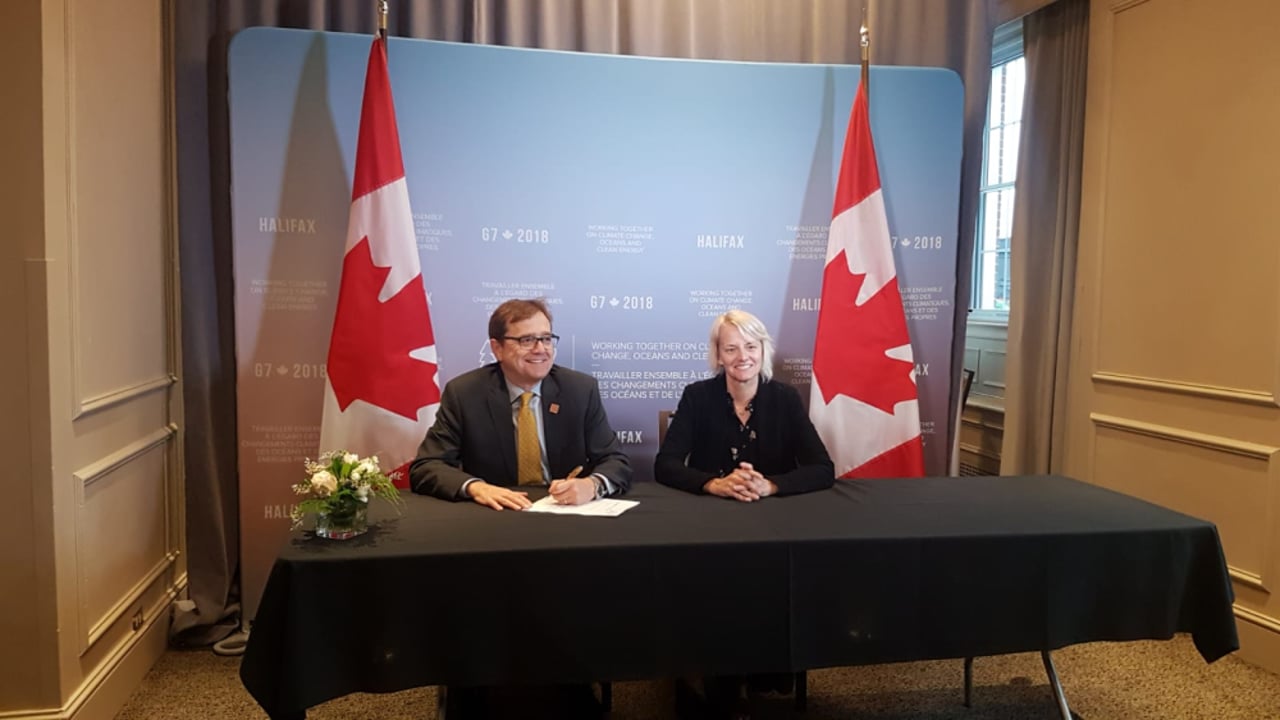
How your support is strengthening animal protection in Canada
News
How your support is strengthening animal protection in Canada
World Animal Protection’s science-based and collaborative approach has helped us become a trusted partner on issues related to animal welfare worldwide. This is a critical part of our mission and how we make the world a better place for animals.
In Canada, we are working with policy makers, enforcement agencies and private companies to strengthen animal protection laws and policies. Below are some of the ways we are working with Canadians to strengthen animal protection.
Pictured below: A screenshot from the first day of our webinar series on the animal welfare, public health and safety and environmental risks associated with the exotic pet trade and solutions for addressing them.
Wild among us: an exotic pet webinar series
The exotic pet trade in Canada is a growing issue impacting animal welfare, local biodiversity and posing risks to human health and safety. In October 2020, World Animal Protection hosted a weekly webinar series to bring together key groups in animal welfare, conservation, public health sectors and all levels of government on this issue, with an average 150-200 people attending each session and more than 400 registrants in total.
We had experts in the field speak and participate in a live Q&A and provide practical tools for addressing animal welfare issues in various fields (i.e. developing positive list regulations, guidance for bylaw enforcement officers, and more). To measure the impact of the series, attendees were surveyed pre- and post-event, which revealed a 96% increase in awareness and understanding of critical issues, and 94% agreeing they have a role to play in addressing exotic pet problems.
With attendees from every province in Canada, and also around the world from Brazil to China, World Animal Protection is building a movement of key groups who are impacted by the exotic pet trade including those who can effect change.
Ontario’s animal welfare advisory group
Since 1919, the Ontario Society for the Prevention of Cruelty to Animals (OSPCA) has been enforcing animal protection laws in Ontario. In 2019, the OSPCA announced that it was going to withdraw from its enforcement duties as of March 31 because of inadequate funding. These events led to the new Provincial Animal Welfare Services (PAWS) Act which came into force on January 1st 2020.
In 2019, World Animal Protection met with the Ontario government to provide input on the new Act. The PAWS Act is an improvement and it is encouraging that the government has recognized the importance of protecting animals in the province, but there is still a lot of work to do.
In 2020, the government invited us to take part in the Animal Welfare Advisory Table that will provide recommendations to the government about the regulations under the new Act. We are delighted to participate and to be able to provide recommendations on a range of animal welfare issues.
Pictured below: Our campaign manager Lynn Kavanagh and the former Minister of Fisheries and Oceans signing the Global Ghost Gear Initiative statement of support.
Canada’s role in the Global Ghost Gear Initiative
Lost and abandoned fishing gear, also known as 'ghost gear', is one of the biggest threats to ocean wildlife, causing injuries or death to animals that become entangled in the gear. Ghost gear is also a major contributor to plastic pollution.
After engaging and lobbying the Canadian government on the ghost gear issue for a few years, Canada joined the Global Ghost Gear Initiative (GGGI) in 2018 at the G7 meeting in Halifax. Since then, the government has kept its promise of fighting the ghost gear problem by establishing a dedicated ghost gear program which includes removal efforts and well as a funding program for NGOs, companies, and fisheries groups to retrieve lost gear and develop solutions to prevent gear from being lost in the first place.
To-date, the government has funded several projects in Canada and other regions including the Caribbean, and Vanuatu and the Solomon Islands. Projects are multi-faceted and include efforts such as lost gear retrieval, implementing gear disposal options, education and outreach to fishers, capacity-building through stakeholder workshops, gear marking pilot projects, mapping gear loss to identify hotspots, and recycling and circular economy initiatives whereby end-of-life gear in re-purposed into a new, useable product. Click here to learn more about these projects.
Cleaning up our oceans of harmful ghost gear not only helps to reduce the risk of harm to threatened and endangered species, protects all animals from the pain and suffering from being entangled on lost fishing gear and debris and helps to protect our fisheries that are already under threat from over-fishing. We are so proud of the work we have done on this issue and that the GGGI continues to grow and develop!
WestJet stops promoting captive dolphin entertainment
In 2020, the pandemic brought travel to a halt and led many to begin rethinking how they might travel in the future in the ‘new normal’. There is a sense that nothing may ever be the same again and in the case of wildlife tourism, it should never be the same again. Dolphins exploited for tourist entertainment suffer greatly and World Animal Protection has been working with travel companies to remove these offerings from their supply chain and help build the industry back better, as a resilient, responsible and sustainable tourism sector.
People are also rethinking their relationship with animals and Canadian attitudes on the use of wildlife for tourism entertainment are shifting. Between 2014 and 2019 there was a 10% decline in the acceptance of swim with dolphin experiences, as well as historic legislative change in Canada banning the keeping, breeding and trading of cetaceans (dolphins, whales and porpoises) for entertainment purposes, with the passing of Bill S-203 in 2019. We have every reason to believe that these trends will continue after the pandemic given increased concern about health and safety and the growing awareness of the role of wildlife exploitation in zoonotic disease risk and pandemics.
As a result of mounting scientific evidence against keeping dolphins in captivity and changing public attitudes towards their exploitation for tourism entertainment, Canadian travel companies are responding with commitments to change their supply chains. In 2019, Air Canada, Transat and Sunwing committed to ending the sale and promotion of tickets to captive dolphin venues, with WestJet confirming their commitment in late 2020. The commitment made by these Canadian travel companies will help put an end to the cruel dolphin entertainment industry and continue to shift tourist demand toward more ethical experiences.
The Travel Corporation and its family of 40 brands strengthens its animal welfare policy
In April 2020, The Travel Corporation (TTC) and its TreadRight Foundation launched their new animal welfare policy, developed in collaboration with World Animal Protection. This builds off their decision in 2014 to remove elephant rides and create an inaugural animal welfare policy in 2015. They are one of the first global travel companies to adopt the more progressive Five Domains framework for assessing the impact of the experiences they offer on animal welfare.
The new policy takes a firmer stance against the breeding, display and trade in cetaceans and other wild animals for tourist entertainment and the use of animals for fights. The new policy is now communicated to suppliers and the company will be measuring progress through annual impact reports. As TTC owns 40 travel brands, this has tremendous impact on animals lives worldwide. We are thrilled they remain committed to animal welfare and working with us to help transition the wider tourism industry away from wildlife cruelty and towards more wildlife-friendly experiences.
Pictured below: Canadian MP Nathaniel Erskine-Smith accepting Canadian petition signatures from our Campaign Director Melissa Matlow
Global campaign calling on Canada and other countries to ban the global wildlife trade
In 2020, the world was profoundly impacted by COVID-19, a textbook example of an emerging zoonotic disease (a disease transmitted between animals and humans). The wildlife trade played a significant role in COVID-19 and other outbreaks like SARS, and is fundamentally linked to our exploitation of wild animals and our encroachment on their habitats. Shutting down wildlife markets and curbing the wildlife trade is the most effective way to prevent future pandemics.
In response, World Animal Protection launched a global campaign calling on G20 countries to take action. In June, we delivered a joint open letter to our Prime Minister and other key Ministers urging the government of Canada to commit to ending the global wildlife trade at the G20 Summit and to take action nationally. The letter was signed and supported by a coalition of Canadian animal welfare and wildlife protection organizations, scientists, and prominent Canadian musicians including Jann Arden and Buffy Sainte-Marie.
In July, we commissioned a national poll revealing that nearly all Canadians agree that the wildlife trade is cruel, causes suffering, threatens biodiversity and public health and strongly support the need for government action to be taken on this issue. World Animal Protection continuously met and briefed more than 50 MPs, Senators and senior staff of key ministries.
In the lead-up to the G20 Leaders’ Summit, we delivered our petition supported by over 50,000 Canadians, to MP Nathaniel Erskine-Smith who shared them with the Prime Minister’s Office. Another 1,900 Canadians sent letters to their MPs to encourage their support. Momentum continues as Canadian MPs are starting to express their support for the campaign, including from MP Michelle Rempel-Garner who sponsored our petition to the House of Commons.
While we were pleased that the G20 Agriculture Ministers recognized the role of the wildlife trade in spreading zoonotic disease risk, our work continues in 2021, as we look for commitments to end the trade at the G20 Summit in Italy. We hope Canada will lead the way.
Canada’s first-ever Code of Practice for fish
Fish welfare is a growing concern among the public and industry stakeholders. Because of this, the Canadian aquaculture (fish farming) industry was motivated to develop the first ever Code of Practice for Farmed Salmon species. As a member of the National Farm Animal Care Council (NFACC), World Animal Protection represented the animal welfare perspective for this Code.
The code is an important first step for fish welfare in Canada. While aspects of the code could be stronger, it signals a growing recognition by the fish farming industry that fish are sentient beings whose needs and potential to suffer must be taken seriously.
In addition to our role on the new code, we provided guidance and encouraged the public to submit feedback during the public comment period on areas that could be stronger. We also published an op-ed in the Halifax Chronicle to raise awareness of fish sentience and the key welfare issues and encourage the public to submit comments.
We hope the code will have broad pick-up an adoption by the aquaculture industry to make important and necessary improvements to the welfare of farmed fish.
Thanks to your ongoing support, we are creating a brighter future for animals. Thank you!


